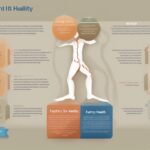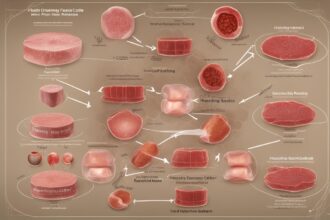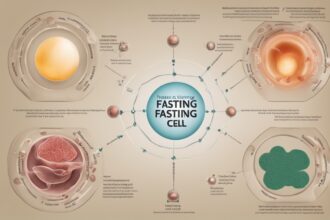Hey there, health enthusiasts! If you’ve been exploring ways to optimize your wellness, you’ve likely stumbled upon the buzz around fasting. Not only is fasting a powerful tool for weight management and mental clarity, but recent research has uncovered a fascinating link between fasting and stem cells. Yes, those tiny building blocks of life that regenerate and repair our bodies! In this deep dive, we’ll explore how fasting can supercharge stem cell activity, why it matters for your health, and share actionable fasting tips to help you get started. Whether you’re a seasoned faster or just curious, let’s unpack the science and practical steps to harness these benefits.
What Are Stem Cells and Why Do They Matter?
Stem cells are the body’s raw materials—think of them as the ultimate repair crew. They have the remarkable ability to develop into various cell types, from muscle to nerve cells, and play a crucial role in tissue repair and regeneration. As we age, though, stem cell function declines, which can slow healing and contribute to chronic conditions. That’s where fasting comes in. Emerging studies suggest that fasting can “reset” and boost stem cell activity, particularly in the gut and blood systems, potentially reversing some age-related decline (Mihaylova et al., 2018). This connection is a game-changer for anyone looking to enhance longevity and vitality through natural methods like fasting.
How Does Fasting Influence Stem Cell Regeneration?
Let’s get into the nitty-gritty. Fasting, especially prolonged or intermittent fasting, triggers a state of metabolic stress that forces your body to adapt. During fasting, your body shifts from using glucose as its primary fuel to burning fat through a process called ketosis. This metabolic switch not only conserves energy but also signals stem cells to kick into high gear. Research shows that fasting promotes the regeneration of intestinal stem cells, which are vital for gut health and immunity (Mihaylova et al., 2018). Additionally, fasting reduces inflammation and clears out damaged cells through autophagy, creating a cleaner slate for stem cells to thrive (Bagherniya et al., 2018). It’s like hitting a refresh button on your body’s repair system!
The Science Behind Fasting and Hematopoietic Stem Cells
One of the most exciting areas of research focuses on hematopoietic stem cells (HSCs), which are responsible for producing blood and immune cells. A groundbreaking study found that prolonged fasting (48–72 hours) in mice led to a significant boost in HSC regeneration, effectively rejuvenating the immune system (Cheng et al., 2014). While human studies are still evolving, early evidence suggests similar effects, particularly in contexts like chemotherapy recovery, where fasting may protect and regenerate immune cells. This could mean that incorporating fasting tips into your routine might not just help with weight loss but also fortify your body’s defenses over time.
Practical Fasting Tips to Support Stem Cell Health
Now that we’ve covered the “why,” let’s talk about the “how.” Fasting doesn’t have to be intimidating, and with the right approach, you can support stem cell regeneration while maintaining balance. Here are some beginner-friendly fasting tips to integrate into your lifestyle:
- Start with Intermittent Fasting (IF): Try the 16:8 method—fast for 16 hours and eat during an 8-hour window. This gives your body a break to focus on repair without extreme deprivation.
- Hydrate Like a Pro: During fasting periods, drink plenty of water or herbal teas to stay hydrated and support cellular processes.
- Break Your Fast Gently: After fasting, opt for nutrient-dense foods like bone broth or avocado to ease your digestive system back into action.
- Listen to Your Body: If you feel dizzy or overly fatigued, scale back. Fasting should feel sustainable, not punishing.
- Consult a Professional: If you have medical conditions, speak with a healthcare provider before diving into extended fasts.
Types of Fasting to Boost Stem Cell Activity
Not all fasting is created equal, and different approaches can yield varying benefits for stem cell health. Whether you’re looking for easy fasting tips for beginners or advanced strategies, here’s a breakdown of fasting types that may support regeneration:
- prolonged fasting: fasting for 48–72 hours under supervision can mimic the effects seen in studies on HSC regeneration (Cheng et al., 2014).
- Time-Restricted Eating: Limiting food intake to a 4–6 hour window daily can reduce inflammation, indirectly supporting stem cell function.
- Fasting-Mimicking Diet (FMD): Developed by Dr. Valter Longo, this low-calorie, plant-based plan mimics fasting’s benefits over 5 days, showing promise for cellular rejuvenation (Brandhorst et al., 2015).
Potential Risks and How to Fast Safely
While the benefits of fasting for stem cell health are exciting, it’s not a one-size-fits-all solution. Fasting can pose risks if not done mindfully, especially for those with underlying health issues. prolonged fasting may lead to nutrient deficiencies or exacerbate conditions like diabetes if not monitored (Johnstone, 2015). Pregnant women, children, and individuals with eating disorders should avoid fasting altogether. To keep things safe, always prioritize gradual progression and seek guidance if you’re unsure. Combining these fasting tips and tricks with common sense ensures you reap the rewards without the pitfalls.
At the end of the day, fasting is a powerful tool to potentially enhance stem cell regeneration and overall health, but it’s all about finding what works for you. The science is promising—fasting may help reset your immune system, repair your gut, and slow aging at a cellular level. By incorporating practical fasting tips like starting small, staying hydrated, and choosing the right fasting method, you can explore these benefits safely. Remember, this isn’t just about skipping meals; it’s about giving your body the space to heal and thrive. So, why not give it a try? Start with a simple intermittent fast, track how you feel, and watch your wellness journey unfold. Here’s to health, regeneration, and the incredible power of fasting!
References
- Bagherniya, M., Butler, A. E., Barreto, G. E., & Sahebkar, A. (2018). The effect of fasting or calorie restriction on autophagy induction: A review of the literature. Ageing Research Reviews, 47, 183-197.
- Brandhorst, S., Choi, I. Y., Wei, M., Cheng, C. W., Sedrakyan, S., Navarrete, G., … & Longo, V. D. (2015). A periodic diet that mimics fasting promotes multi-system regeneration, enhanced cognitive performance, and healthspan. Cell Metabolism, 22(1), 86-99.
- Cheng, C. W., Adams, G. B., Perin, L., Wei, M., Zhou, X., Lam, B. S., … & Longo, V. D. (2014). Prolonged fasting reduces IGF-1/PKA to promote hematopoietic-stem-cell-based regeneration and reverse immunosuppression. Cell Stem Cell, 14(6), 810-823.
- Johnstone, A. (2015). Fasting for weight loss: An effective strategy or latest dieting trend? International Journal of Obesity, 39(5), 727-733.
- Longo, V. D., & Mattson, M. P. (2014). Fasting: Molecular mechanisms and clinical applications. Cell Metabolism, 19(2), 181-192.
- Mihaylova, M. M., Cheng, C. W., Cao, A. Q., Tripathi, S., Mana, M. D., Bauer-Rowe, K. E., … & Yilmaz, Ö. H. (2018). Fasting activates fatty acid oxidation to enhance intestinal stem cell function during homeostasis and aging. Cell Stem Cell, 22(5), 769-778.






